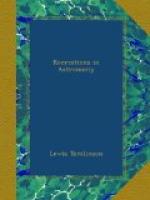[Page 259] God’s intimate relation to matter is explained. No wonder the forces respond to his will; no wonder pantheism—the idea that matter is God—has had such a hold upon the minds of men. Matter, derived from him, bears marks of its parentage, is sustained by him, and when the Divine will shall draw it nearer to himself the new power and capabilities of a new creation shall appear. Let us pay a higher respect to the attractions and affinities; to the plan and power of growth; to the wisdom of the ant; the geometry of the bee; the migrating instinct that rises and stretches its wings toward a provided South—for it is all God’s present wisdom and power. Let us come to that true insight of the old prophets, who are fittingly called seers; whose eyes pierced the veil of matter, and saw God clothing the grass of the field, feeding the sparrows, giving snow like wool and scattering hoar-frost like ashes, and ever standing on the bow of our wide-sailing world, and ever saying to all tumultuous forces, “Peace, be still.” Let us, with more reverent step, walk the leafy solitudes, and say:
“Father,
thy hand
Hath reared these venerable columns:
Thou
Did’st weave this verdant roof.
Thou did’st look down
Upon the naked earth, and forthwise rose
All these fair ranks of trees. They
in Thy sun
Budded, and shook their green leaves in
Thy breeze.
“That delicate forest flower,
With scented breath and looks so like a smile,
Seems, as it issues from the shapeless mould,
An emanation of the indwelling life,
A visible token of the unfolding love
That are the soul of this wide universe.”—BRYANT.
[Page 260] Philosophy has seen the vast machine of the universe, wheel within wheel, in countless numbers and hopeless intricacy. But it has not had the spiritual insight of Ezekiel to see that they were everyone of them full of eyes—God’s own emblem of the omniscient supervision.




